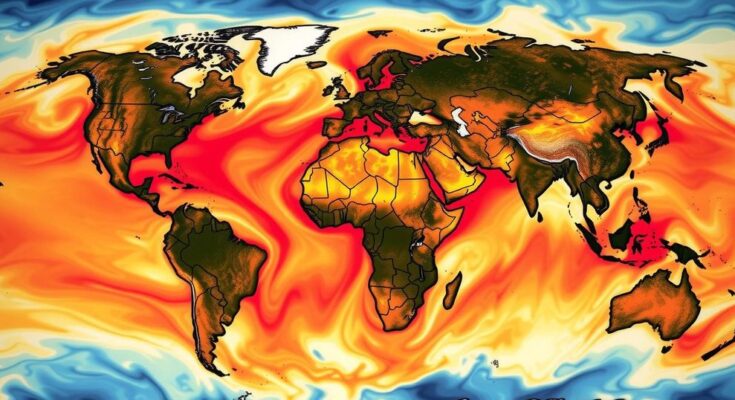Scientists indicate that 2024 is on track to become the hottest year on record, surpassing 1.5 degrees Celsius above pre-industrial levels. Extreme weather events globally underscore the impact of climate change. The recent UN climate agreement aimed at tackling climate issues has faced criticism for inadequacy, while CO2 emissions continue to rise. La Nina’s potential onset is monitored as a possible short-term cooling factor, not a solution to climate challenges.
European Union scientists have asserted that 2024 is set to become the hottest year on record, with forecasts indicating that high temperatures will persist into at least early 2025. The European Commission’s Copernicus Climate Change Service (C3S) has confirmed that data from January to November identifies 2024 as the first year in which average global temperatures surpassed 1.5 degrees Celsius above the pre-industrial benchmark of 1850-1900. This alarming trend follows a year that recorded exceptionally severe weather events worldwide, with extreme heat and devastating floods impacting numerous regions significantly.
The conclusion of UN climate discussions earlier this month, which resulted in a $300-billion agreement aimed at enhancing climate action, has drawn criticism from poorer nations for being inadequate to address the escalating costs associated with climate-induced catastrophes. Severe weather has been prolific in 2024, with incidents such as droughts in Italy and South America, floods in Nepal, Sudan, and Europe, and record heatwaves claiming lives across Mexico, Mali, and Saudi Arabia, all of which have been linked to human-induced climate change.
As of the end of November, global temperatures remain precariously high, with Copernicus researcher Julien Nicolas indicating that “we’re still in near-record-high territory for global temperatures, and that’s likely to stay at least for the next few months.” The primary driver of this alarming climate crisis is the rising carbon dioxide emissions stemming from fossil fuel consumption. Despite various governmental pledges toward achieving net zero emissions, the year 2024 is projected to witness record CO2 emissions.
Attention is being directed towards the potential emergence of a La Nina weather pattern in 2025, which may temporarily reduce global temperatures. However, this should not be misconstrued as a resolution to the ongoing global warming trend fueled by emissions. Friederike Otto, a senior lecturer at Imperial College London, opined that “while 2025 might be slightly cooler than 2024, if a La Nina event develops, this does not mean temperatures will be ‘safe’ or ‘normal.'” The global temperature records maintained by C3S, which date back to 1940, corroborate these findings with supporting data from global records extending as far back as 1850.
The article discusses critical findings by European Union scientists regarding global temperature trends and the related effects of climate change. China’s Copernicus Climate Change Service (C3S) is highlighted for its role in analyzing climate data and projecting future trends. Background information on the recent UN climate talks underlines the urgency to address the inadequacies in climate funding for poorer nations and the aggressive pace of climate deterioration evident in extreme weather patterns this year.
In summary, the data reveals that 2024 is projected to be the hottest year recorded, driven significantly by human activities contributing to climate change. The implications of extreme weather events and rising greenhouse gas emissions stress the importance of immediate and effective climate action. Despite potential climatic fluctuations in 2025, the long-term trajectory remains concerning, necessitating a global commitment to mitigating climate change.
Original Source: www.euractiv.com




